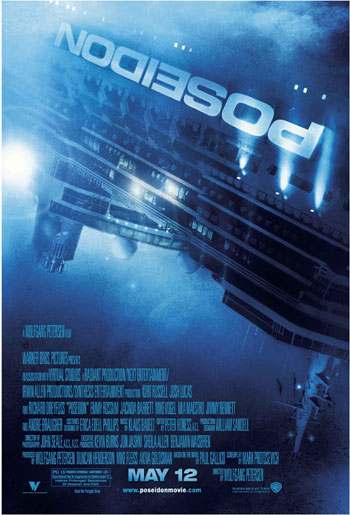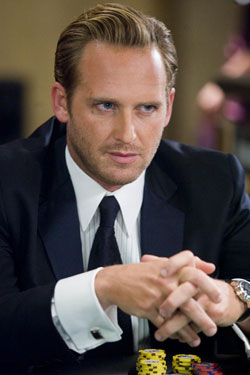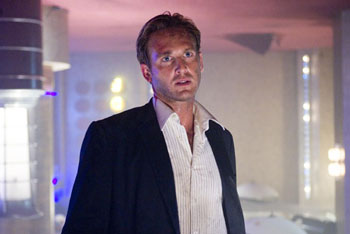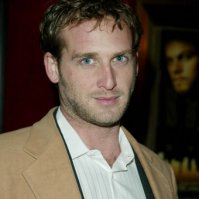 Here’s what we know about Josh Lucas’ character in Poseidon: He’s a card sharp, he’s an ex-Navy man, and he’s got a thing for MILFs. When I spoke to Lucas at the Poseidon junket at the end of April he admitted that not only is there not much more to the character but that he actively tried to reduce the character. That’s an interesting take – most actors are doing whatever they can to flesh out their characters and get them more emotional time.
Here’s what we know about Josh Lucas’ character in Poseidon: He’s a card sharp, he’s an ex-Navy man, and he’s got a thing for MILFs. When I spoke to Lucas at the Poseidon junket at the end of April he admitted that not only is there not much more to the character but that he actively tried to reduce the character. That’s an interesting take – most actors are doing whatever they can to flesh out their characters and get them more emotional time.
Which means you can never claim that Josh Lucas isn’t completely dedicated to the project. And we love him for it – Lucas has been a CHUD favorite for years now. His work in Hulk really cemented it, but for another side of Lucas I highly recommend renting David Gordon Green’s Undertow, an absolutely incredible movie where Lucas turns in a performance of perfect menace.
Josh Lucas in real life has an easygoing charm. I’m actually surprised that the guy isn’t a bigger movie star by now – not just because I think he does good work, but just because he seems like the kind of a guy directors would enjoy working with. When he came into my roundtable room at the Beverly Regent Wilshire he noticed that many of us had copies of the original Poseidon Adventure novel, which came in our goodie bag (please note that I was the only person there with an authentic Poseidon life preserver. Seriously)
Lucas: We did not make that book.
Q: Was there ever any hint of the book at any stage of the script?
Lucas: The first conversation I had with Wolfgang was, ‘I don’t want to remake the original, and I don’t really want to make the book either.’ His fascination was I think very similar – the first conversation he and I had was, [he wanted] to do what is basically a trilogy, which is Das Boot, The Perfect Storm and then this one, and deal with moving from huge panoramic Hollywood-type film or a big party setting into basically a claustrophobic hell, and an ascent out of that hell. But not from a spiritual sense, like the book, just sort of pure survival.
Q: Was there anything cut in terms of dialogue or additional characters? It’s a surprisingly short film especially for a Wolfgang Petersen movie. Did you work on trying to extend the character at all?
Lucas: I’ll be honest with you, I worked on trying to cut it. First of all we were making this movie during a time of consistent horrific disasters. The world was obviously seeing trauma at a very high level, and I felt like there was no way people are going to deal with – I’ll tell you a story, first of all I heard an amazing story from Katrina from a police detective who was talking to one of the people he worked with who was stuck in an attic, and the guy ended up drowning. And he was basically on the microphone with him as he drowned. Basically what came out of that for me was you can’t have bogus dialogue, they’re not going get to know each other in this situation. If you go back and look at the original, that is kind of the strength of the original – the playful, in a sense, cheesiness of the situation. Richard, Kurt, me and Wolfgang, all had constant conversations saying that this doesn’t work, the dialogue here, because people would not talk during this situation. The sets and the kind of filmmaking that Wolfgang was doing was so violently heightened that you come into a room and there are dead bodies all around the room, and you’re not going to have a conversation about where are you from, what’s your sexuality; those [were the] moments that we were basically cutting out of the movie as we were going. Which I felt actually in a sense sort of honored the truth of the situation more than it would have otherwise.
 Q: Did you think twice about doing this – some of those scenes were so claustrophobic and you must have been wet for how many months?
Q: Did you think twice about doing this – some of those scenes were so claustrophobic and you must have been wet for how many months?
Lucas: I was wet for five months. I was wet about three months earlier than the rest of the cast, because I dive [early] so basically from then on… it’s interesting to watch the movie, because you sit there and go, ‘I can’t really tell how wet I am,’ but I’m soaking wet in every single scene, and do I need to be soaking wet in every single scene? It was one of the things I had a battle with; I would sit in this little silly hot tub, or even a kid’s pool sometimes, just sit there and wait until they start to roll the camera and then get out. But your skin gets so soft that you can cut it with your fingernail. It’s gross. It’s absolutely amazing what happens to your body when you’re in water for that period of time.
Q: Did you get hurt?
Lucas: Yeah, you’re going to be hearing this from everyone; it’s so funny if you get a look at the commentary because Wolfgang the whole time is having a ball, he’s ‘This is so fun, I’m having so much fun,’ and the rest of us were in hell.
I was hospitalized twice on this movie for two different injuries, two major different injuries. You can’t see underwater, it’s a whole fallacy. Basically when you’re dealing with that level of debris – first of all the [bubbles] in the water are being created by the different water cannons basically, so it takes your ability to see and cuts it down from five feet to two feet. You’re literally swimming by Braille at times, you’re swimming by strobe-lights, because you’re just heading for something. So when people are swimming close together, they bang off each other and smash into each other. So Kurt at one point swung his metal flashlight back and tore open my eye. And you see it on camera where there’s a moment where the blood is starting to… at a certain point it very subtle, because they cut at the point where it explodes and starts pouring down my head. So they shut down production for that day and I had stitches.
Q: Why put yourself through all of this?
Lucas: I really like physical filmmaking, honestly. I think there’s a real sense of physical truth in this movie, and it’s because he built those sets and put us in the situation, and you see it, there’s nothing fake in this movie; we’re there. Obviously the boat is not real, but all those environments are real; all that fire, all that water, everything about what’s going through.
So the second time I fell during the sequence where we flood that tank and I crawl up the wall. I fell and snapped the muscle in my thumb and had to have surgery to rebuild.
Look, I never compare what I do, we do, to a real job. But truthfully, this was as close to going to work on an oilrig as you can get. We were hurt, everyone was sick the whole time, you’ll hear from everyone –
Q: What did you get sick with?
Lucas: Because you’re dealing with a human Petri dish, that’s it. Every single person is in that water. At one point I was sitting there and I was looking down, I was in the water, and I was like ‘Wait a second, those guys, those safety people about 30 feet down, how long have they been down there?’ Like eight hours – they can’t get out from the time they go to the time they get out, so they’re peeing in the water absolutely! And little Jimmy Bennett, the boy, was like ‘I don’t pee in the water.’ I was like, ‘I do, man.’
Q: How did that kid cope with all that stuff?
Lucas: He was such – not just a trooper, he’s a different child, because he was having a ball. It was play session for him, where he basically got to go jump around in a pool all day and act terrified. I don’t think there’s a moment where they used a body-double for him except for the jump, otherwise it’s entirely him. So sometimes the challenge with Jimmy would be: this isn’t fun, you have to remember what hell and terror this is, and he would get that, he’s a very interesting kid.
It was play session for him, where he basically got to go jump around in a pool all day and act terrified. I don’t think there’s a moment where they used a body-double for him except for the jump, otherwise it’s entirely him. So sometimes the challenge with Jimmy would be: this isn’t fun, you have to remember what hell and terror this is, and he would get that, he’s a very interesting kid.
Q: As an actor when you’re doing a film like this versus being on stage what’re the different acting muscles that you use?
Lucas: You’re not really acting much in this movie. You’re not, because you’re reacting. The thing that I really tried to settle into and connect to was who is this guy inside, and what can you show from the inside that’s not through dialogue, that’s through subtle little moments of this man’s independent, maybe roguish danger, or mysteriousness in the beginning, that then he becomes someone who’s not doing so well at a certain point. All that has to be totally internal because it’s not dialogue, and that becomes a really interesting challenge inside of a reactionary environment At one point Kurt was like, ‘Fuck, my hair’s on fire.’ I’m not kidding! It was that sort of thing all the time. So you’re sitting there going okay, in this environment which is so real, and so tough, and so violent, and so difficult, how do I then have the moments of whatever is really going on with this character, which I felt was always internal, always very quiet and always very subtle.
Q: How much Dylan did you create in advance, did you create a back story for him?
Lucas: Yeah, that’s what me and Wolfgang and Akiva, a group of us tried to talk about those little things. But again we were stripping them honestly, we weren’t worried about adding them, it was quite the opposite, these people would not be talking in this situation.
Q: But just for you, in your own head. Like in the film, we know he was in the Navy, but not why he left. Did you know why he left?
Lucas: Absolutely, totally.
Q: He seems angry.
Lucas: Yeah, I think there’s a sense of him being a bit dangerous in that he’s not totally happy with his life. I always saw him as someone who’s not good enough to hustle in Las Vegas and so he’s kind of stuck on these cruise ships, which is why he knows how to deal with getting off of it a little bit. It was a point of self-hatred that he could only play in a place like that.
Q: You weren’t one of the actors who went on a cruise as research for the film?
Lucas: No, Richard did. I said, ‘What? What’s wrong with you?’ I wouldn’t go on a cruise. To be in a contained space with a lot of people is – I heard a story the other day just from someone who’d been on a cruise ship, actually the QE2, and they’re on the bridge and someone said, ‘Do you see that bend down there?’ and there was an actually bend in the QE2. I guess they had been hit by a rogue wave at night, 110 foot rogue wave. Basically they drove it correctly, but it actually bent the boat, and three passengers complained about something during the night, and that was it. But they rode over it.
Q: Did you go through underwater training for the movie? Lucas: A lot of us oddly enough were certified divers, which is one of the things that is interesting, it’s one of those weird moments where you’re like, ‘How come they didn’t ask us this?’ I guess they just assumed if you decided to do this movie that you would be able to go through it. This was the most difficult, physical water work I’ve done, and I am a certified diver who’s done some of that stuff – but there’s no comparison though when you’re dealing with what the reality of this filming situation was. Tthe fact that you cannot see was so challenging, and then being stuck – I was idiotic, like Richard I guess, where I would go – I had a pool and I would spend time practicing holding my breath. And ! would sit there and be like, [pretends to hold breath] a minute-forty-five – and really training yourself to work yourself to be able to do some of those shots because I wanted them to be somewhat real and for Wolfgang to go and shoot them the way that I think he did, which is you see someone swim for a truly long period of time without edits.
Lucas: A lot of us oddly enough were certified divers, which is one of the things that is interesting, it’s one of those weird moments where you’re like, ‘How come they didn’t ask us this?’ I guess they just assumed if you decided to do this movie that you would be able to go through it. This was the most difficult, physical water work I’ve done, and I am a certified diver who’s done some of that stuff – but there’s no comparison though when you’re dealing with what the reality of this filming situation was. Tthe fact that you cannot see was so challenging, and then being stuck – I was idiotic, like Richard I guess, where I would go – I had a pool and I would spend time practicing holding my breath. And ! would sit there and be like, [pretends to hold breath] a minute-forty-five – and really training yourself to work yourself to be able to do some of those shots because I wanted them to be somewhat real and for Wolfgang to go and shoot them the way that I think he did, which is you see someone swim for a truly long period of time without edits.
Q: What’s next for you?
Lucas: The thing I’m most proud of is I’m involved with Ken Burns’ The War, which is his next documentary, which is an absolute masterpiece.
Q: As a narrator?
Lucas: One of the characters in it who reads the stories, reads the experience.
Q: Aside from Kurt hitting you on the head, did you talk about anything not related to the film while you were working together?
Lucas: Consistently, all of us did. First of all, you have two guys who have been in this business for such a long period of time, and you ask Richard about the great stories of working with Jaws and why he knows water work the way he knows it. But Kurt it was the same thing – what we had, and I really find it very boring when actors sit around and say everyone liked each other, but truthfully had we not liked each other on this movie it would be have been impossible, because it was so physically difficult. Because of it everyone was in collaboration – there’s an odd lack of ego I would say, where everyone was showing up and going this is extremely difficult, let’s help each other through it, which is kind of what the characters have.
And honestly Kurt and I got along ten times better than they characters do, even though there’s not that much there, but there’s still a sense of friction, it was just an odd sort of sense of joy, just bouncing back and forth telling stories. He’s an amazing man. He’s a genuine, genuine human being, which you don’t meet very often in this business. I think acting to him is something that is one of the many things that he loves. It’s a lesson to watch his love of his family, his love of flying, his love of all these different things that he breaks down in his life, and that’s what I’ve seen be the failure of actors at a certain level who are so completely career focused that they’re mad, and he’s the absolute opposite. He’s just an absolute treat. And Richard’s so – my favorite moment with Richard is, he says to me, ‘You know I’m very smart.’ You get to know Richard, and he’s extremely smart. That’s the lesson between these two men was how they are both doing so many different things, intellectually challenging themselves in so many different ways, Richard now is a professor at Oxford University, that’s where he went from Poseidon.